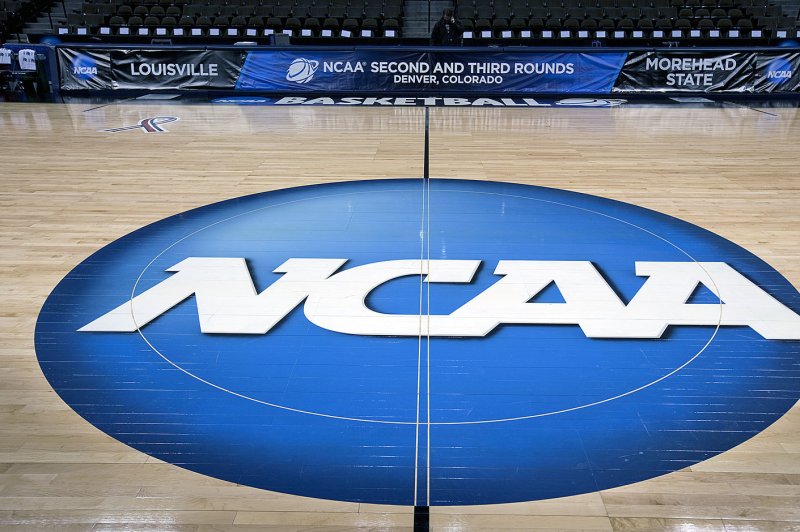1 of 5 | The 2022 tournament is the first to fully return to normal after the last two were affected by the COVID-19 pandemic. The 2020 tournament was canceled entirely for the first time in its history and most stakeholders lost a lot of money that year. File Photo by Gary Caskey/UPI |
License Photo
March 18 (UPI) -- March Madness began with a wild opening day on Thursday that saw several upsets and busted millions of brackets. But you could say that real madness occurs far away from the court, on the business side of things.
Each year, the NCAA tournament is a financial boon in many corners of the market -- but perhaps none bigger than online sports betting, which is legal in several parts of the United States.
That means more Americans can place wagers on games as 68 teams vie for college basketball's national championship. But it also means economic windfalls worth tens of millions in other areas like broadcasting and the host cities.
According to the American Gaming Association, more than 17% of American adults -- 45 million people -- plan to wager more than $3 billion on the tournament this year. About three-quarters of the bets are expected to be placed through methods other than filling out tournament brackets, a sizable increase from 55% in 2021.
Officials say that almost 30 million more Americans are able to place legal bets in their home states this year. Thirty states and Washington, D.C., offer legal sports gambling. Nine new states -- Arizona, Connecticut, Louisiana, Maryland, North Dakota, South Dakota, Washington, Wisconsin and Wyoming -- are allowing legalized sports betting for the first time this year.
Despite the rise in legal sports betting throughout the nation, however, Las Vegas continues to be a draw.
More than $500 million was bet on basketball in Nevada last year, and BetMGM director of trading Jeff Stoneback told Yahoo that he expects this year's March Madness to be "our biggest one ever."
"There are two events for sports betting," he said. "The Super Bowl is No. 1. But the tournament is four days. The crowd is into it. There's upsets. This is a four- to five-day event. It's exciting."
CBS and Turner Sports pay hundreds of millions each year for exclusive broadcast rights to the tournament, but there's even more money to spread around.
For all the cities that are host sites this year, college basketball's biggest tournament means an influx of big bucks.
Experts say Pittsburgh, which is hosting first- and second-round games, should see about $10.5 million in revenue for hosting games in the men's and women's tournaments this weekend.
"Such a large part of the country is vaccinated and we're seeing a reduction of the Omicron [COVID-19] variant, so people are ready to be back inside again," Jennifer Hawkins, executive director of SportsPITTSBURGH, said, according to KDKA-TV.
"They want to be at the first real March Madness back."
Buffalo, N.Y., which is hosting March Madness games for the first time in five years, expects more than 17,000 people to visit the city as a result, with an economic impact of $7.5 million.
"These events are expected to generate a lot of dollars, giving a big and much needed economic boost to our city, while providing us with a real opportunity to showcase Buffalo to the nation and the world," Mayor Byron Brown said, according to WKBW-TV.
Meanwhile in Milwaukee, more than 18,000 fans are expected to attend tournament games at Fiserv Forum on Friday and Sunday -- which should bring in around $6.5 million.
"While we anticipate two days of exciting basketball games, we are also thrilled for the community to experience the free open practice sessions that will tip off March Madness in Milwaukee," Peter Feigin, president of the Milwaukee Bucks and Fiserv Forum, said, according to the Biz Times.
In Fort Worth, Texas, they're expecting a similar economic boost for hosting first- and second-round tournament games. This year's tournament is the first to have any games in Fort Worth since 1970.
"For the first time in three years, all of the excitement is back in person across the nation," the city's sports commission chief Jason Sands said, according to the Fort Worth Business Press. "And for Fort Worth to be one of only eight cities to host the first and second rounds is a great honor."
The 2022 tournament is the first to fully return to normal after the last two were affected by the COVID-19 pandemic. The 2020 tournament was canceled entirely for the first time in its history and most stakeholders lost a lot of money that year.
Going forward, the NCAA has taken steps to safeguard its investment in the event that it has to cancel March Madness again sometime in the future.
In January, the NCAA's Board of Governors voted unanimously to spend $175 million to establish an insurance "captive" -- a form of self-insurance in which the buyer effectively establishes its own company -- to address potential issues, including a shortfall, as part of its cancellation insurance policy.
"One of the risks included in its captive is event cancellation after an analysis revealed lack of coverage, limited access to markets and the increased cost of event cancellation insurance available in the commercial insurance marketplace," the NCAA said in a statement to CBS Sports.
The new self-insurance policy took effect on March 1. The $175 million set aside by the NCAA will also cover liability insurance for the governing body's officers.















